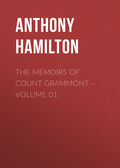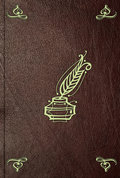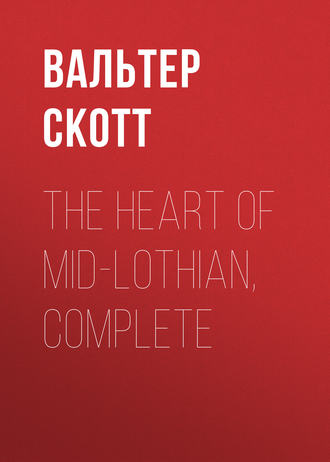
Вальтер Скотт
The Heart of Mid-Lothian, Complete
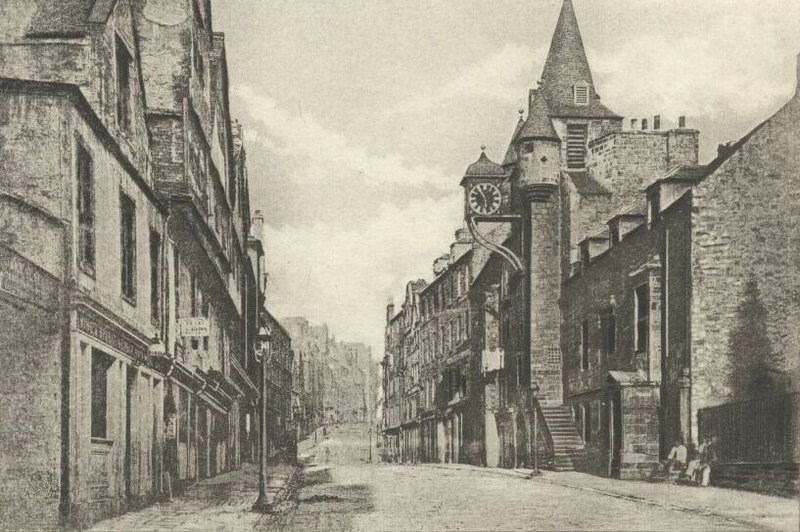
They proceeded with the same prudence when the object seemed to be nearly in their grasp, as they had done hitherto when success was more dubious. A strong party of the rioters, drawn up in front of the Luckenbooths, and facing down the street, prevented all access from the eastward, and the west end of the defile formed by the Luckenbooths was secured in the same manner; so that the Tolbooth was completely surrounded, and those who undertook the task of breaking it open effectually secured against the risk of interruption.
The magistrates, in the meanwhile, had taken the alarm, and assembled in a tavern, with the purpose of raising some strength to subdue the rioters. The deacons, or presidents of the trades, were applied to, but declared there was little chance of their authority being respected by the craftsmen, where it was the object to save a man so obnoxious. Mr. Lindsay, member of parliament for the city, volunteered the perilous task of carrying a verbal message, from the Lord Provost to Colonel Moyle, the commander of the regiment lying in the Canongate, requesting him to force the Netherbow Port, and enter the city to put down the tumult. But Mr. Lindsay declined to charge himself with any written order, which, if found on his person by an enraged mob, might have cost him his life; and the issue, of the application was, that Colonel Moyle having no written requisition from the civil authorities, and having the fate of Porteous before his eyes as an example of the severe construction put by a jury on the proceedings of military men acting on their own responsibility, declined to encounter the risk to which the Provost’s verbal communication invited him.
More than one messenger was despatched by different ways to the Castle, to require the commanding officer to march down his troops, to fire a few cannon-shot, or even to throw a shell among the mob, for the purpose of clearing the streets. But so strict and watchful were the various patrols whom the rioters had established in different parts of the streets, that none of the emissaries of the magistrates could reach the gate of the Castle. They were, however, turned back without either injury or insult, and with nothing more of menace than was necessary to deter them from again attempting to accomplish their errand.
The same vigilance was used to prevent everybody of the higher, and those which, in this case, might be deemed the more suspicious orders of society, from appearing in the street, and observing the movements, or distinguishing the persons, of the rioters. Every person in the garb of a gentleman was stopped by small parties of two or three of the mob, who partly exhorted, partly required of them, that they should return to the place from whence they came. Many a quadrille table was spoilt that memorable evening; for the sedan chairs of ladies; even of the highest rank, were interrupted in their passage from one point to another, in spite of the laced footmen and blazing flambeaux. This was uniformly done with a deference and attention to the feelings of the terrified females, which could hardly have been expected from the videttes of a mob so desperate. Those who stopped the chair usually made the excuse, that there was much disturbance on the streets, and that it was absolutely necessary for the lady’s safety that the chair should turn back. They offered themselves to escort the vehicles which they had thus interrupted in their progress, from the apprehension, probably, that some of those who had casually united themselves to the riot might disgrace their systematic and determined plan of vengeance, by those acts of general insult and license which are common on similar occasions.
Persons are yet living who remember to have heard from the mouths of ladies thus interrupted on their journey in the manner we have described, that they were escorted to their lodgings by the young men who stopped them, and even handed out of their chairs, with a polite attention far beyond what was consistent with their dress, which was apparently that of journeymen mechanics.15
It seemed as if the conspirators, like those who assassinated Cardinal Beatoun in former days, had entertained the opinion, that the work about which they went was a judgment of Heaven, which, though unsanctioned by the usual authorities, ought to be proceeded in with order and gravity.
While their outposts continued thus vigilant, and suffered themselves neither from fear nor curiosity to neglect that part of the duty assigned to them, and while the main guards to the east and west secured them against interruption, a select body of the rioters thundered at the door of the jail, and demanded instant admission. No one answered, for the outer keeper had prudently made his escape with the keys at the commencement of the riot, and was nowhere to be found. The door was instantly assailed with sledge-hammers, iron crows, and the coulters of ploughs, ready provided for the purpose, with which they prized, heaved, and battered for some time with little effect; for the door, besides being of double oak planks, clenched, both endlong and athwart, with broad-headed nails, was so hung and secured as to yield to no means of forcing, without the expenditure of much time. The rioters, however, appeared determined to gain admittance. Gang after gang relieved each other at the exercise, for, of course, only a few could work at once; but gang after gang retired, exhausted with their violent exertions, without making much progress in forcing the prison door. Butler had been led up near to this the principal scene of action; so near, indeed, that he was almost deafened by the unceasing clang of the heavy fore-hammers against the iron-bound portal of the prison. He began to entertain hopes, as the task seemed protracted, that the populace might give it over in despair, or that some rescue might arrive to disperse them. There was a moment at which the latter seemed probable.
The magistrates, having assembled their officers, and some of the citizens who were willing to hazard themselves for the public tranquillity, now sallied forth from the tavern where they held their sitting, and approached the point of danger. Their officers went before them with links and torches, with a herald to read the riot-act, if necessary. They easily drove before them the outposts and videttes of the rioters; but when they approached the line of guard which the mob, or rather, we should say, the conspirators, had drawn across the street in the front of the Luckenbooths, they were received with an unintermitted volley of stones, and, on their nearer approach, the pikes, bayonets, and Lochaber-axes, of which the populace had possessed themselves, were presented against them. One of their ordinary officers, a strong resolute fellow, went forward, seized a rioter, and took from him a musket; but, being unsupported, he was instantly thrown on his back in the street, and disarmed in his turn. The officer was too happy to be permitted to rise and run away without receiving any farther injury; which afforded another remarkable instance of the mode in which these men had united a sort of moderation towards all others, with the most inflexible inveteracy against the object of their resentment. The magistrates, after vain attempts to make themselves heard and obeyed, possessing no means of enforcing their authority, were constrained to abandon the field to the rioters, and retreat in all speed from the showers of missiles that whistled around their ears.
The passive resistance of the Tolbooth gate promised to do more to baffle the purpose of the mob than the active interference of the magistrates. The heavy sledge-hammers continued to din against it without intermission, and with a noise which, echoed from the lofty buildings around the spot, seemed enough to have alarmed the garrison in the Castle. It was circulated among the rioters, that the troops would march down to disperse them, unless they could execute their purpose without loss of time; or that, even without quitting the fortress, the garrison might obtain the same end by throwing a bomb or two upon the street.
Urged by such motives for apprehension, they eagerly relieved each other at the labour of assailing the Tolbooth door: yet such was its strength, that it still defied their efforts. At length, a voice was heard to pronounce the words, “Try it with fire.” The rioters, with an unanimous shout, called for combustibles, and as all their wishes seemed to be instantly supplied, they were soon in possession of two or three empty tar-barrels. A huge red glaring bonfire speedily arose close to the door of the prison, sending up a tall column of smoke and flame against its antique turrets and strongly-grated windows, and illuminating the ferocious and wild gestures of the rioters, who surrounded the place, as well as the pale and anxious groups of those, who, from windows in the vicinage, watched the progress of this alarming scene. The mob fed the fire with whatever they could find fit for the purpose. The flames roared and crackled among the heaps of nourishment piled on the fire, and a terrible shout soon announced that the door had kindled, and was in the act of being destroyed. The fire was suffered to decay, but, long ere it was quite extinguished, the most forward of the rioters rushed, in their impatience, one after another, over its yet smouldering remains. Thick showers of sparkles rose high in the air, as man after man bounded over the glowing embers, and disturbed them in their passage. It was now obvious to Butler, and all others who were present, that the rioters would be instantly in possession of their victim, and have it in their power to work their pleasure upon him, whatever that might be.16
CHAPTER SIXTH
The evil you teach us,
We will execute; and it shall go hard, but we will
Better the instruction.
Merchant of Venice.
The unhappy object of this remarkable disturbance had been that day delivered from the apprehension of public execution, and his joy was the greater, as he had some reason to question whether Government would have run the risk of unpopularity by interfering in his favour, after he had been legally convicted by the verdict of a jury, of a crime so very obnoxious. Relieved from this doubtful state of mind, his heart was merry within him, and he thought, in the emphatic words of Scripture on a similar occasion, that surely the bitterness of death was past. Some of his friends, however, who had watched the manner and behaviour of the crowd when they were made acquainted with the reprieve, were of a different opinion. They augured, from the unusual sternness and silence with which they bore their disappointment, that the populace nourished some scheme of sudden and desperate vengeance; and they advised Porteous to lose no time in petitioning the proper authorities, that he might be conveyed to the Castle under a sufficient guard, to remain there in security until his ultimate fate should be determined. Habituated, however, by his office, to overawe the rabble of the city, Porteous could not suspect them of an attempt so audacious as to storm a strong and defensible prison; and, despising the advice by which he might have been saved, he spent the afternoon of the eventful day in giving an entertainment to some friends who visited him in jail, several of whom, by the indulgence of the Captain of the Tolbooth, with whom he had an old intimacy, arising from their official connection, were even permitted to remain to supper with him, though contrary to the rules of the jail.
It was, therefore, in the hour of unalloyed mirth, when this unfortunate wretch was “full of bread,” hot with wine, and high in mistimed and ill-grounded confidence, and alas! with all his sins full blown, when the first distant’ shouts of the rioters mingled with the song of merriment and intemperance. The hurried call of the jailor to the guests, requiring them instantly to depart, and his yet more hasty intimation that a dreadful and determined mob had possessed themselves of the city gates and guard-house, were the first explanation of these fearful clamours.
Porteous might, however, have eluded the fury from which the force of authority could not protect him, had he thought of slipping on some disguise, and leaving the prison along with his guests. It is probable that the jailor might have connived at his escape, or even that in the hurry of this alarming contingency, he might not have observed it. But Porteous and his friends alike wanted presence of mind to suggest or execute such a plan of escape. The former hastily fled from a place where their own safety seemed compromised, and the latter, in a state resembling stupefaction, awaited in his apartment the termination of the enterprise of the rioters. The cessation of the clang of the instruments with which they had at first attempted to force the door, gave him momentary relief. The flattering hopes, that the military had marched into the city, either from the Castle or from the suburbs, and that the rioters were intimidated, and dispersing, were soon destroyed by the broad and glaring light of the flames, which, illuminating through the grated window every corner of his apartment, plainly showed that the mob, determined on their fatal purpose, had adopted a means of forcing entrance equally desperate and certain.
The sudden glare of light suggested to the stupified and astonished object of popular hatred the possibility of concealment or escape. To rush to the chimney, to ascend it at the risk of suffocation, were the only means which seemed to have occurred to him; but his progress was speedily stopped by one of those iron gratings, which are, for the sake of security, usually placed across the vents of buildings designed for imprisonment. The bars, however, which impeded his farther progress, served to support him in the situation which he had gained, and he seized them with the tenacious grasp of one who esteemed himself clinging to his last hope of existence. The lurid light which had filled the apartment, lowered and died away; the sound of shouts was heard within the walls, and on the narrow and winding stair, which, eased within one of the turrets, gave access to the upper apartments of the prison. The huzza of the rioters was answered by a shout wild and desperate as their own, the cry, namely, of the imprisoned felons, who, expecting to be liberated in the general confusion, welcomed the mob as their deliverers. By some of these the apartment of Porteous was pointed out to his enemies. The obstacle of the lock and bolts was soon overcome, and from his hiding place the unfortunate man heard his enemies search every corner of the apartment, with oaths and maledictions, which would but shock the reader if we recorded them, but which served to prove, could it have admitted of doubt, the settled purpose of soul with which they sought his destruction.
A place of concealment so obvious to suspicion and scrutiny as that which Porteous had chosen, could not long screen him from detection. He was dragged from his lurking-place, with a violence which seemed to argue an intention to put him to death on the spot. More than one weapon was directed towards him, when one of the rioters, the same whose female disguise had been particularly noticed by Butler, interfered in an authoritative tone. “Are ye mad?” he said, “or would ye execute an act of justice as if it were a crime and a cruelty? This sacrifice will lose half its savour if we do not offer it at the very horns of the altar. We will have him die where a murderer should die, on the common gibbet—We will have him die where he spilled the blood of so many innocents!”
A loud shout of applause followed the proposal, and the cry, “To the gallows with the murderer!—to the Grassmarket with him!” echoed on all hands.
“Let no man hurt him,” continued the speaker; “let him make his peace with God, if he can; we will not kill both his soul and body.”
“What time did he give better folk for preparing their account?” answered several voices. “Let us mete to him with the same measure he measured to them.”
But the opinion of the spokesman better suited the temper of those he addressed, a temper rather stubborn than impetuous, sedate though ferocious, and desirous of colouring their cruel and revengeful action with a show of justice and moderation.
For an instant this man quitted the prisoner, whom he consigned to a selected guard, with instructions to permit him to give his money and property to whomsoever he pleased. A person confined in the jail for debt received this last deposit from the trembling hand of the victim, who was at the same time permitted to make some other brief arrangements to meet his approaching fate. The felons, and all others who, wished to leave the jail, were now at full liberty to do so; not that their liberation made any part of the settled purpose of the rioters, but it followed as almost a necessary consequence of forcing the jail doors. With wild cries of jubilee they joined the mob, or disappeared among the narrow lanes to seek out the hidden receptacles of vice and infamy, where they were accustomed to lurk and conceal themselves from justice.
Two persons, a man about fifty years old and a girl about eighteen, were all who continued within the fatal walls, excepting two or three debtors, who probably saw no advantage in attempting their escape. The persons we have mentioned remained in the strong room of the prison, now deserted by all others. One of their late companions in misfortune called out to the man to make his escape, in the tone of an acquaintance. “Rin for it, Ratcliffe—the road’s clear.”
“It may be sae, Willie,” answered Ratcliffe, composedly, “but I have taen a fancy to leave aff trade, and set up for an honest man.”
“Stay there, and be hanged, then, for a donnard auld deevil!” said the other, and ran down the prison stair.
The person in female attire whom we have distinguished as one of the most active rioters, was about the same time at the ear of the young woman. “Flee, Effie, flee!” was all he had time to whisper. She turned towards him an eye of mingled fear, affection, and upbraiding, all contending with a sort of stupified surprise. He again repeated, “Flee, Effie, flee! for the sake of all that’s good and dear to you!” Again she gazed on him, but was unable to answer. A loud noise was now heard, and the name of Madge Wildfire was repeatedly called from the bottom of the staircase.
“I am coming,—I am coming,” said the person who answered to that appellative; and then reiterating hastily, “For God’s sake—for your own sake—for my sake, flee, or they’ll take your life!” he left the strong room.
The girl gazed after him for a moment, and then, faintly muttering, “Better tyne life, since tint is gude fame,” she sunk her head upon her hand, and remained, seemingly, unconscious as a statue of the noise and tumult which passed around her.
That tumult was now transferred from the inside to the outside of the Tolbooth. The mob had brought their destined victim forth, and were about to conduct him to the common place of execution, which they had fixed as the scene of his death. The leader, whom they distinguished by the name of Madge Wildfire, had been summoned to assist at the procession by the impatient shouts of his confederates.
“I will insure you five hundred pounds,” said the unhappy man, grasping Wildfire’s hand,—“five hundred pounds for to save my life.”
The other answered in the same undertone, and returning his grasp with one equally convulsive, “Five hundredweight of coined gold should not save you.—Remember Wilson!”
A deep pause of a minute ensued, when Wildfire added, in a more composed tone, “Make your peace with Heaven.—Where is the clergyman?”
Butler, who in great terror and anxiety, had been detained within a few yards of the Tolbooth door, to wait the event of the search after Porteous, was now brought forward, and commanded to walk by the prisoner’s side, and to prepare him for immediate death. His answer was a supplication that the rioters would consider what they did. “You are neither judges nor jury,” said he. “You cannot have, by the laws of God or man, power to take away the life of a human creature, however deserving he may be of death. If it is murder even in a lawful magistrate to execute an offender otherwise than in the place, time, and manner which the judges’ sentence prescribes, what must it be in you, who have no warrant for interference but your own wills? In the name of Him who is all mercy, show mercy to this unhappy man, and do not dip your hands in his blood, nor rush into the very crime which you are desirous of avenging!”
“Cut your sermon short—you are not in your pulpit,” answered one of the rioters.
“If we hear more of your clavers,” said another, “we are like to hang you up beside him.”
“Peace—hush!” said Wildfire. “Do the good man no harm—he discharges his conscience, and I like him the better.”
He then addressed Butler. “Now, sir, we have patiently heard you, and we just wish you to understand, in the way of answer, that you may as well argue to the ashlar-work and iron stanchels of the Tolbooth as think to change our purpose—Blood must have blood. We have sworn to each other by the deepest oaths ever were pledged, that Porteous shall die the death he deserves so richly; therefore, speak no more to us, but prepare him for death as well as the briefness of his change will permit.”
They had suffered the unfortunate Porteous to put on his night-gown and slippers, as he had thrown off his coat and shoes, in order to facilitate his attempted escape up the chimney. In this garb he was now mounted on the hands of two of the rioters, clasped together, so as to form what is called in Scotland, “The King’s Cushion.” Butler was placed close to his side, and repeatedly urged to perform a duty always the most painful which can be imposed on a clergyman deserving of the name, and now rendered more so by the peculiar and horrid circumstances of the criminal’s case. Porteous at first uttered some supplications for mercy, but when he found that there was no chance that these would be attended to, his military education, and the natural stubbornness of his disposition, combined to support his spirits.
“Are you prepared for this dreadful end?” said Butler, in a faltering voice. “O turn to Him, in whose eyes time and space have no existence, and to whom a few minutes are as a lifetime, and a lifetime as a minute.”
“I believe I know what you would say,” answered Porteous sullenly. “I was bred a soldier; if they will murder me without time, let my sins as well as my blood lie at their door.”
“Who was it,” said the stern voice of Wildfire, “that said to Wilson at this very spot, when he could not pray, owing to the galling agony of his fetters, that his pains would soon be over?—I say to you to take your own tale home; and if you cannot profit by the good man’s lessons, blame not them that are still more merciful to you than you were to others.”
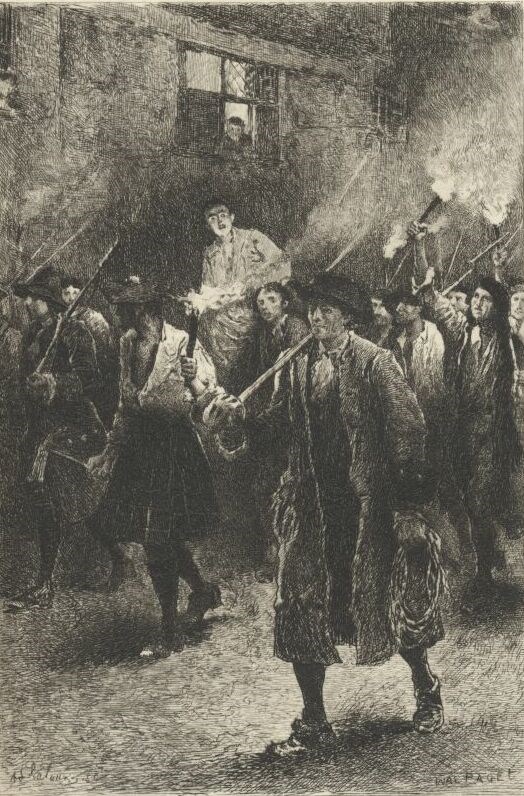
The procession now moved forward with a slow and determined pace. It was enlightened by many blazing, links and torches; for the actors of this work were so far from affecting any secrecy on the occasion, that they seemed even to court observation. Their principal leaders kept close to the person of the prisoner, whose pallid yet stubborn features were seen distinctly by the torch-light, as his person was raised considerably above the concourse which thronged around him. Those who bore swords, muskets, and battle-axes, marched on each side, as if forming a regular guard to the procession. The windows, as they went along, were filled with the inhabitants, whose slumbers had been broken by this unusual disturbance. Some of the spectators muttered accents of encouragement; but in general they were so much appalled by a sight so strange and audacious, that they looked on with a sort of stupified astonishment. No one offered, by act or word, the slightest interruption.
The rioters, on their part, continued to act with the same air of deliberate confidence and security which had marked all their proceedings. When the object of their resentment dropped one of his slippers, they stopped, sought for it, and replaced it upon his foot with great deliberation.17
As they descended the Bow towards the fatal spot where they designed to complete their purpose, it was suggested that there should be a rope kept in readiness. For this purpose the booth of a man who dealt in cordage was forced open, a coil of rope fit for their purpose was selected to serve as a halter, and the dealer next morning found that a guinea had been left on his counter in exchange; so anxious were the perpetrators of this daring action to show that they meditated not the slightest wrong or infraction of law, excepting so far as Porteous was himself concerned.
Leading, or carrying along with them, in this determined and regular manner, the object of their vengeance, they at length reached the place of common execution, the scene of his crime, and destined spot of his sufferings. Several of the rioters (if they should not rather be described as conspirators) endeavoured to remove the stone which filled up the socket in which the end of the fatal tree was sunk when it was erected for its fatal purpose; others sought for the means of constructing a temporary gibbet, the place in which the gallows itself was deposited being reported too secure to be forced, without much loss of time. Butler endeavoured to avail himself of the delay afforded by these circumstances, to turn the people from their desperate design. “For God’s sake,” he exclaimed, “remember it is the image of your Creator which you are about to deface in the person of this unfortunate man! Wretched as he is, and wicked as he may be, he has a share in every promise of Scripture, and you cannot destroy him in impenitence without blotting his name from the Book of Life—Do not destroy soul and body; give time for preparation.”
“What time had they,” returned a stern voice, “whom he murdered on this very spot?—The laws both of God and man call for his death.”
“But what, my friends,” insisted Butler, with a generous disregard to his own safety—“what hath constituted you his judges?”
“We are not his judges,” replied the same person; “he has been already judged and condemned by lawful authority. We are those whom Heaven, and our righteous anger, have stirred up to execute judgment, when a corrupt Government would have protected a murderer.”
“I am none,” said the unfortunate Porteous; “that which you charge upon me fell out in self-defence, in the lawful exercise of my duty.”
“Away with him—away with him!” was the general cry.
“Why do you trifle away time in making a gallows?—that dyester’s pole is good enough for the homicide.”
The unhappy man was forced to his fate with remorseless rapidity. Butler, separated from him by the press, escaped the last horrors of his struggles. Unnoticed by those who had hitherto detained him as a prisoner,—he fled from the fatal spot, without much caring in what direction his course lay. A loud shout proclaimed the stern delight with which the agents of this deed regarded its completion. Butler, then, at the opening into the low street called the Cowgate, cast back a terrified glance, and, by the red and dusky light of the torches, he could discern a figure wavering and struggling as it hung suspended above the heads of the multitude, and could even observe men striking at it with their Lochaber-axes and partisans. The sight was of a nature to double his horror, and to add wings to his flight.
The street down which the fugitive ran opens to one of the eastern ports or gates of the city. Butler did not stop till he reached it, but found it still shut. He waited nearly an hour, walking up and down in inexpressible perturbation of mind. At length he ventured to call out, and rouse the attention of the terrified keepers of the gate, who now found themselves at liberty to resume their office without interruption. Butler requested them to open the gate. They hesitated. He told them his name and occupation.
“He is a preacher,” said one; “I have heard him preach in Haddo’s-hole.”
“A fine preaching has he been at the night,” said another “but maybe least said is sunest mended.”
Opening then the wicket of the main gate, the keepers suffered Butler to depart, who hastened to carry his horror and fear beyond the walls of Edinburgh. His first purpose was instantly to take the road homeward; but other fears and cares, connected with the news he had learned in that remarkable day, induced him to linger in the neighbourhood of Edinburgh until daybreak. More than one group of persons passed him as he was whiling away the hours of darkness that yet remained, whom, from the stifled tones of their discourse, the unwonted hour when they travelled, and the hasty pace at which they walked, he conjectured to have been engaged in the late fatal transaction.
Certain it was, that the sudden and total dispersion of the rioters, when their vindictive purpose was accomplished, seemed not the least remarkable feature of this singular affair. In general, whatever may be the impelling motive by which a mob is at first raised, the attainment of their object has usually been only found to lead the way to farther excesses. But not so in the present case. They seemed completely satiated with the vengeance they had prosecuted with such stanch and sagacious activity. When they were fully satisfied that life had abandoned their victim, they dispersed in every direction, throwing down the weapons which they had only assumed to enable them to carry through their purpose. At daybreak there remained not the least token of the events of the night, excepting the corpse of Porteous, which still hung suspended in the place where he had suffered, and the arms of various kinds which the rioters had taken from the city guard-house, which were found scattered about the streets as they had thrown them from their hands when the purpose for which they had seized them was accomplished.



